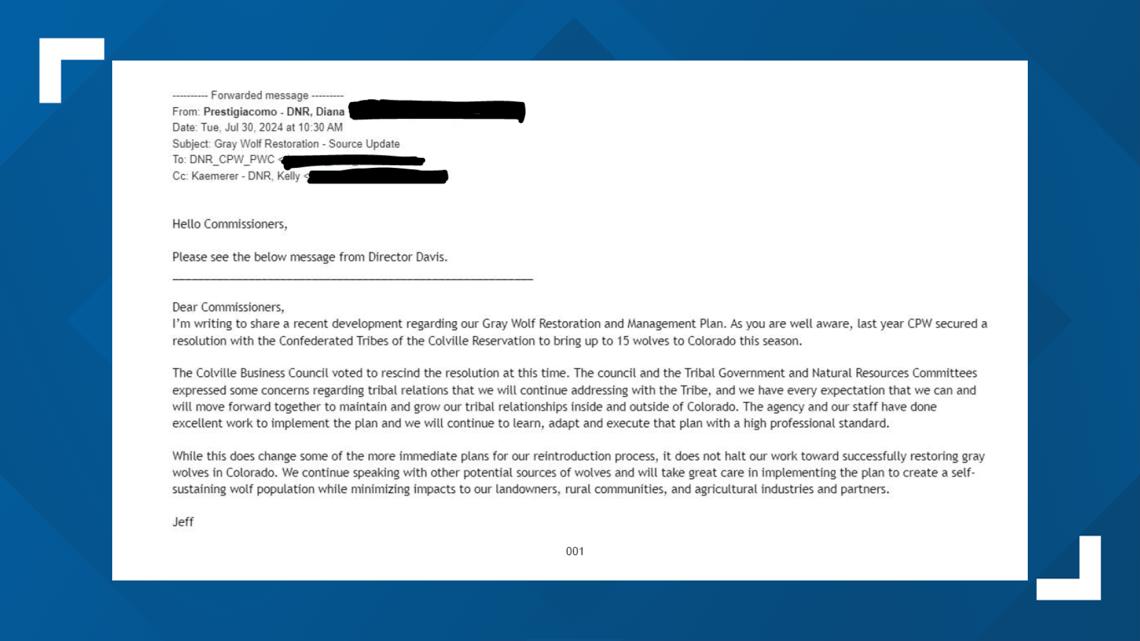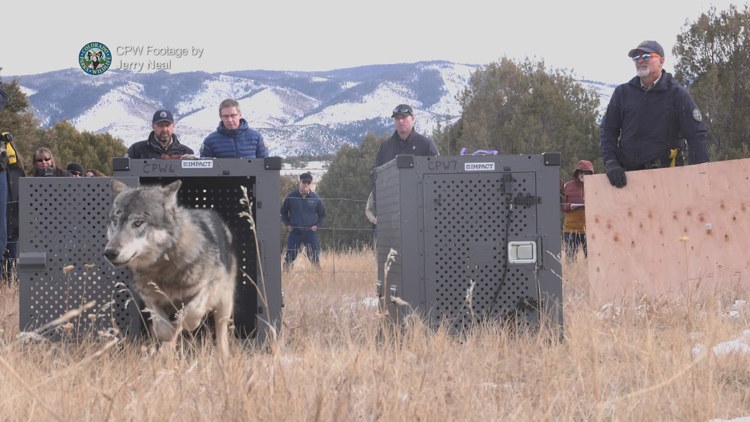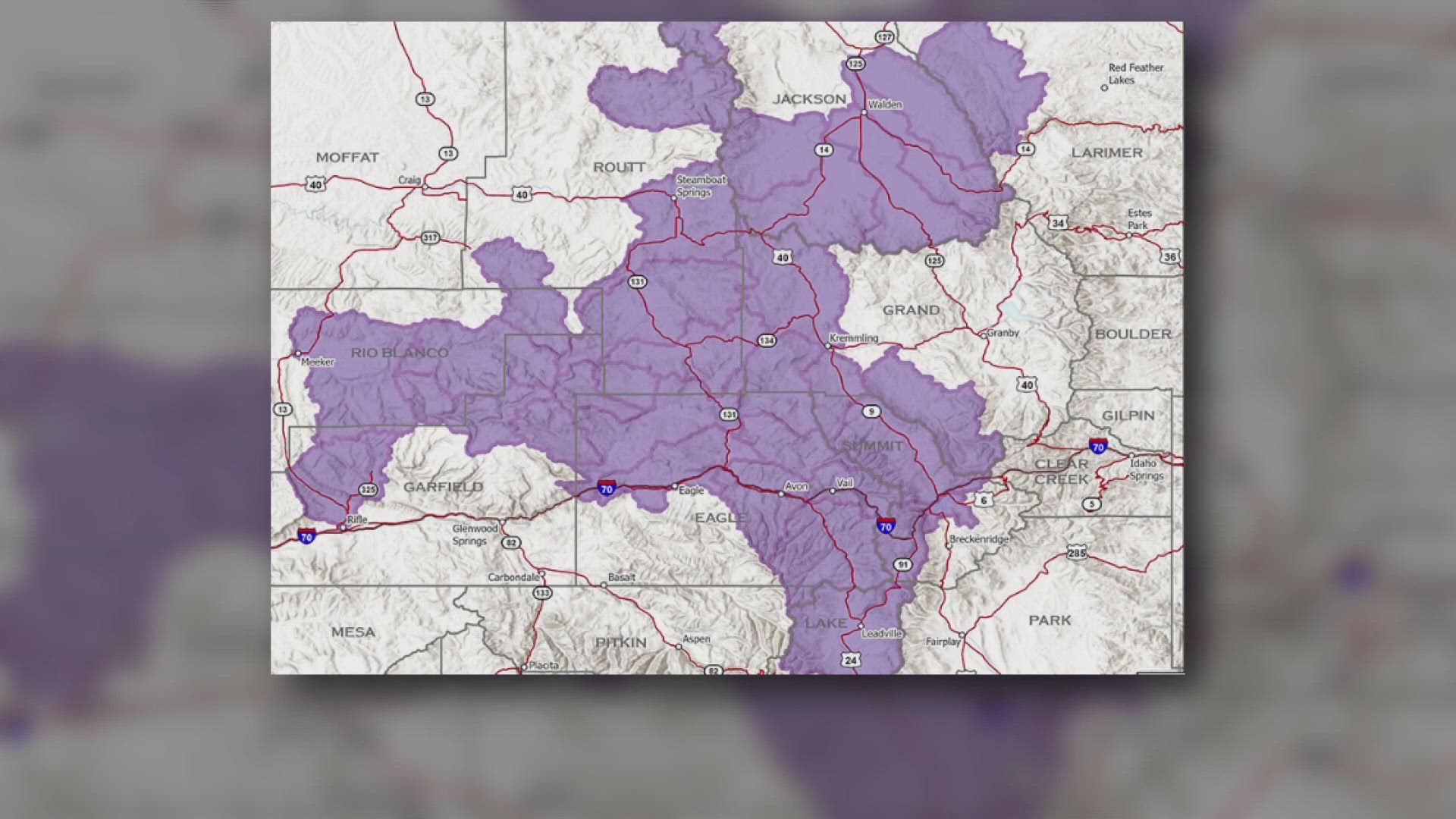DENVER — Colorado Parks and Wildlife (CPW) officials found out on June 11 that its source for more wolves had changed its mind, a CPW spokesperson told 9NEWS Investigates, but CPW did not share that information with the public for more than a month.
After CPW's leaders learned that the deal had collapsed, they did not tell CPW commissioners until weeks later, on July 30, including keeping it secret during two public meetings in June and July, 9NEWS Investigates has learned.
On Jan. 19, CPW sent out a news release saying it had secured a source for 15 more wolves: the Confederated Tribes of the Colville Reservation.
"We are grateful to the Confederated Tribes of the Colville Reservation for working with our agency on this critical next step in reintroducing gray wolves in the state," CPW Director Jeff Davis said in the announcement.
Less than six months later the Tribes voted to not provide wolves to Colorado.
" Based on new information regarding the proposed reintroduction project in Colorado, and that we have now learned that the State of Colorado has failed to consult with the Southern Ute Tribe, the Confederated Tribes of the Colville Reservation cannot agree to the request made by the State of Colorado to provide wolves for this project at this time," states the tribe's business council special session resolution index from June 6.
The tribes also wrote a letter dated that day, Thursday, June 6, addressed to Davis.
> Read the letter below:
"It has come to our attention that necessary and meaningful consultation was not completed with the potentially impacted tribes," the letter reads in part. "Out of respect for the sovereignty, cultures and memberships of Indian Tribes in Colorado and neighboring states, who may be impacted by this project, the Colville Tribes cannot assist with this project at this time."
A spokesperson for the tribes said they were off the next day, a Friday, and that CPW was contacted after the weekend.
On June 11, CPW staff received an email from the tribe informing CPW of the possibility of a letter from the Tribal Council informing them that "at this time" the tribe had decided not to provide wolves to Colorado. Davis received the official letter postmarked on June 18 informing CPW that "at this time" the tribe would not be providing wolves to Colorado.
"CPW received an indication that the letter would be coming on June 11," said CPW spokesperson Rachael Gonzales. "This was not a formal notification and was not between signatories to the MOU."
The CPW Commission met the next two days in Winter Park. 9NEWS was there during a heated meeting where wolves were discussed for hours; however, CPW leaders never mentioned the collapsing deal.
The Colville Tribes letter was not mailed for several more days. 9NEWS Investigates received a copy of the envelope in response to a public record request. It shows the letter was stamped on June 18.
CPW commissioners met again, publicly, on July 18 and 19 in Meeker. During that meeting, CPW Deputy Director Reid DeWalt provided the commission with a wolf update that made no mention of the tribes' decision but did discuss communicating better.
"We need to do a better job of communicating with ranchers and their communities after depredations occur. Events this April taught us that despite best and good faith efforts, it is easy for communications to fall short and for significant mistrust to develop. I know this is a major priority for us, CPW, going forward," DeWalt told the commissioners, while not disclosing that the source for new wolves had backed out.
The CPW Commission learned of the tribes' decision on July 30, nearly two months after the tribes' decision was made, according to multiple sources and an email obtained through a record request by 9NEWS Investigates.
This date is also when SteamboatRADIO broke the story.


Commissioners received an email at 10:30 a.m. sent on behalf of Davis.
"The Colville Business Council voted to rescind the resolution at this time," commissioners were told. "... While this does change some of the more immediate plans for our reintroduction process, it does not halt our work towards successfully restoring gray wolves in Colorado."
No commissioners agreed to do an interview with 9NEWS about learning about this almost two months after the tribes' made their decision.
Why didn't CPW tell the public sooner?
The CPW spokesperson, Gonzales, said, "CPW did not notify the public when we received notice from the tribe. We want to clarify that the original agreement has only been rescinded at this time, and it does not close the door to future conversations or opportunities to work with the Tribe. Based on these facts, CPW decided not to release this information.
"Although this alters some of our immediate plans for the reintroduction process, it does not stop our efforts to successfully bring back gray wolves in Colorado. We are continuing to explore potential sources of wolves," she said.
"As staff is planning the next phase of reintroductions, we decided to notify internal stakeholders of the current situation, including the Parks and Wildlife Commission, on July 30," she said.
When did other state officials find out?
Department of Natural Resources (DNR) Director Dan Gibbs sits on the CPW Commission in a non-voting role. He found out much earlier than the rest of the commission.
"Director Gibbs doesn't recall the exact date when he found out about the Confederated Tribes of the Colville Reservation rescinding their offer to provide wolves to Colorado for our states reintroduction efforts. He thinks it was around June 11 and came via CPW Director Jeff Davis," said a DNR spokesperson.
Colorado's commissioner of agriculture, Kate Greenberg, also sits on the commission in a non-voting role.
"As far as Commissioner Greenberg's awareness of this topic, she was notified at the same time the PWC (Parks and Wildlife Commission) was notified," an agriculture department spokesperson said.
Response from Southern Ute Indian Reservation
A spokesperson for the tribe sent this statement to 9NEWS:
"Since the passage of gray wolf reintroduction, the Southern Ute Indian Tribe has been actively engaged in collaborative efforts with Colorado Parks and Wildlife as well as the Colorado Attorney General’s Office to address the Tribe’s concerns, including potential impacts of wolves on livestock, deer and elk herds, and the exercise of Brunot Area hunting rights reserved for Tribal Members. The Tribe also shared its perspectives on the challenges we face and concerns we have regarding reintroduction with the fellow sovereign nation of the Confederated Tribes of the Colville Reservation. The Southern Ute Indian Tribe deeply values its progressive and strong relationship with Colorado Parks and Wildlife, and will continue to collaborate with them to establish a framework for working together that enables the State to implement its reintroduction program while simultaneously recognizing the sovereign authority of the Tribe on tribal lands and the interest shared by the Tribe and the State in the Brunot Area."
The spokesperson did not directly answer that the Southern Ute Indian Reservation communicated to the Colville Tribes.



